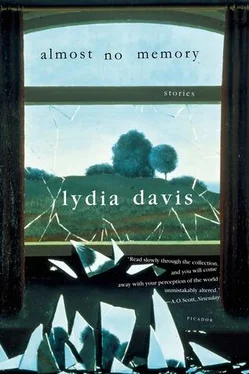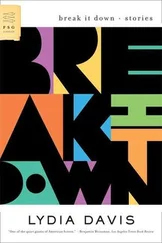Lydia Davis - Almost No Memory
Здесь есть возможность читать онлайн «Lydia Davis - Almost No Memory» весь текст электронной книги совершенно бесплатно (целиком полную версию без сокращений). В некоторых случаях можно слушать аудио, скачать через торрент в формате fb2 и присутствует краткое содержание. Год выпуска: 2001, Издательство: Farrar, Straus and Giroux, Жанр: Современная проза, на английском языке. Описание произведения, (предисловие) а так же отзывы посетителей доступны на портале библиотеки ЛибКат.
- Название:Almost No Memory
- Автор:
- Издательство:Farrar, Straus and Giroux
- Жанр:
- Год:2001
- ISBN:нет данных
- Рейтинг книги:3 / 5. Голосов: 1
-
Избранное:Добавить в избранное
- Отзывы:
-
Ваша оценка:
- 60
- 1
- 2
- 3
- 4
- 5
Almost No Memory: краткое содержание, описание и аннотация
Предлагаем к чтению аннотацию, описание, краткое содержание или предисловие (зависит от того, что написал сам автор книги «Almost No Memory»). Если вы не нашли необходимую информацию о книге — напишите в комментариях, мы постараемся отыскать её.
. In each of these stories, Davis reveals an empathic, sometimes shattering understanding of human relationships.
Almost No Memory — читать онлайн бесплатно полную книгу (весь текст) целиком
Ниже представлен текст книги, разбитый по страницам. Система сохранения места последней прочитанной страницы, позволяет с удобством читать онлайн бесплатно книгу «Almost No Memory», без необходимости каждый раз заново искать на чём Вы остановились. Поставьте закладку, и сможете в любой момент перейти на страницу, на которой закончили чтение.
Интервал:
Закладка:
More important than the clothes a cowboy wore, and the way he wore them, was the fact that a cowboy probably wouldn’t know much more than he had to. He would think about his work, and about his family, if he had one, and about having a good time, and not much else. I was tired of so much thinking, which was what I did most in those days. I did other things, but I went on thinking while I did them. I might feel something, but I would think about what I was feeling at the same time. I even had to think about what I was thinking and wonder why I was thinking it. When I had the idea of marrying a cowboy I imagined that maybe a cowboy would help me stop thinking so much.
I also imagined, though I was probably wrong about this, too, that a cowboy wouldn’t be like anyone I knew — like an old Communist, or a member of a steering committee, a writer of letters to the newspaper, a faculty wife serving tea at a student tea, a professor reading proofs with a sharp pencil and asking everyone to be quiet. I thought that when my mind, always so busy, always going around in circles, always having an idea and then an idea about an idea, reached out to his mind, it would meet something quieter, that there would be more blanks, more open spaces, that some of what he had in his mind might be the sky, clouds, hilltops, and then other concrete things like ropes, saddles, horsehair, the smell of horses and cattle, motor oil, calluses, grease, fences, gullies, dry streambeds, lame cows, stillborn calves, freak calves, veterinarians’ visits, treatments, innoculations. I imagined this even though I knew that some of the things I liked that might be in his mind, like the saddles, the saddle sores, the horsehair, and the horses themselves, weren’t often a part of the life of a cowboy anymore. As for what I would do in my life with this cowboy, I sometimes imagined myself reading quietly in clean clothes in a nice study, but at other times I imagined myself oiling tack or cooking large quantities of plain food or helping out in the barn in the early morning while the cowboy had both arms inside a cow to turn a calf so it would present properly. Problems and chores like these would be clear and I would be able to handle them in a clear way. I wouldn’t stop reading and thinking, but I wouldn’t know very many people who did a lot of that, so I would have more privacy in it, because the cowboy, though so close to me all the time, wouldn’t try to understand but would leave me alone with it. It would not be an embarrassment anymore.
I thought if I married a cowboy, I wouldn’t have to leave the West. I liked the West for its difficulties. First I liked the difficulty of telling when one season was over and another had begun, and then I liked the difficulty of finding any beauty in the landscape where I was. To begin with, I had gotten used to its own kind of ugliness, all those broad highways laid down in the valleys and the new constructions placed up on the bare hillsides. Then I began to find beauty in it, and liked the bareness and the plain brown of the hills in the dry season, and the way the folds in the hills where some dampness tended to linger would fill up with grasses and shrubs and other flowering plants. I liked the plainness of the ocean and the emptiness when I looked out over it. And then, especially since it had been so hard for me to find this beauty, I didn’t want to leave it.
I might have gotten the idea of marrying a cowboy from a movie I saw one night in the springtime with a friend of mine who was also a professor — a handsome and intelligent man kinder than I am, but even more awkward around people, forgetting even the names of old friends in his sudden attacks of shyness. He seemed to enjoy the movie, though I have no idea what was going through his mind. Maybe he was imagining a life with the woman in the movie, who was so different from his thin, nervous, and beautiful wife. As we drove away from the movie theater, on one of those broad highways with nothing ahead or behind but taillights and headlights and nothing on either side but darkness, all I wanted to do was go out into the middle of the desert, as far away as possible from everything I had known all my life, and from the university where I was teaching and the towns and the city near it with all the intelligent people who lived and worked in them, writing down their ideas in notebooks and on computers in their offices and their studies at home and taking notes from difficult books. I wanted to leave all this and go out into the middle of the desert and run a motel by myself with a little boy, and have a worn-out cowboy come along, a worn-out middle-aged cowboy, alcoholic if necessary, and marry him. I thought I knew of a little boy I could take with me. Then all I would need would be the aging cowboy and the motel. I would make it a good motel, I would look after it and I would solve any problems sensibly and right away as they came along. I thought I could be a good, tough businesswoman just because I had seen this movie showing this good, tough businesswoman. This woman also had a loving heart and a capacity to understand another fallible human being. The fact is that if an alcoholic cowboy came into my life in any important way I would probably criticize him to death for his drinking until he walked out on me. But at the time I had that strange confidence, born of watching a good movie, that I could be something different from what I was, and I started listening to country Western music on the car radio, though I knew it wasn’t written for me.
At that point I met a man in one of my classes who seemed reasonably close to my idea of a cowboy, though now I can’t tell exactly why I thought so. He wasn’t really like a cowboy, or what I thought a cowboy might be like, so what I wanted must have been something else, and the idea of a cowboy just came up in my mind for the sake of convenience. The facts weren’t right. He didn’t work as a cowboy but at some kind of job where he glued the bones of chimpanzees together. He played jazz trombone, and on the days when he had a lesson he wore a dark suit to class and carried a black case. He just missed being good-looking, with his square, fleshy, pale face, his dark hair, mustache, dark eyes; just missed being good-looking, not because of his rough cheeks, which were scarred from shrapnel, but because of a loose or wild look about him, his eyes wide open all the time, even when he smiled, and his body very still, only his eyes moving, watching everything, missing nothing. Wary, he was ready to defend himself as though every conversation might also be something of a fight.
One day when a group of us were having a beer together after class, he was quiet, seemed very low, and finally said to us, without raising his eyes, that he thought he might be going to move in with his father and send his little girl back to her mother. He said he didn’t think it was fair to keep her because sometimes he would just sit in a chair without speaking — she would try to talk to him and he wouldn’t be able to open his mouth, she would keep on trying and he would sit there knowing he had to answer her but unable to.
His rudeness and wildness were comfortable to me at that point, and because he would tease me now and then, I thought he liked me enough so that I could ask him to go out to dinner with me, and finally I did, just to see what would happen. He seemed startled, then pleased to accept, sobered and flattered at this attention from his professor.
The date didn’t turn out to be something that would change the direction of my life, though that’s not what I was expecting then, only what I thought about afterwards. He was very late coming to pick me up at the graduate-student housing compound where I was staying. Just when I had decided he wasn’t coming, after I had spent an hour pacing more and more hopelessly out onto my tiny tree-shaded balcony, which overlooked a playground and the parking lot, and back into my tiny living room, which was crowded with the things of some young couple I didn’t know, he came in wearing an old work shirt with the sleeves rolled up and brown corduroys with the cord worn off on the thighs. He stopped and looked around as though he were about to get to work on something, then spotted the piano and bent over it for a moment and played a fast, pretty tune just long enough to make me happy again, then broke it off in the middle.
Читать дальшеИнтервал:
Закладка:
Похожие книги на «Almost No Memory»
Представляем Вашему вниманию похожие книги на «Almost No Memory» списком для выбора. Мы отобрали схожую по названию и смыслу литературу в надежде предоставить читателям больше вариантов отыскать новые, интересные, ещё непрочитанные произведения.
Обсуждение, отзывы о книге «Almost No Memory» и просто собственные мнения читателей. Оставьте ваши комментарии, напишите, что Вы думаете о произведении, его смысле или главных героях. Укажите что конкретно понравилось, а что нет, и почему Вы так считаете.












